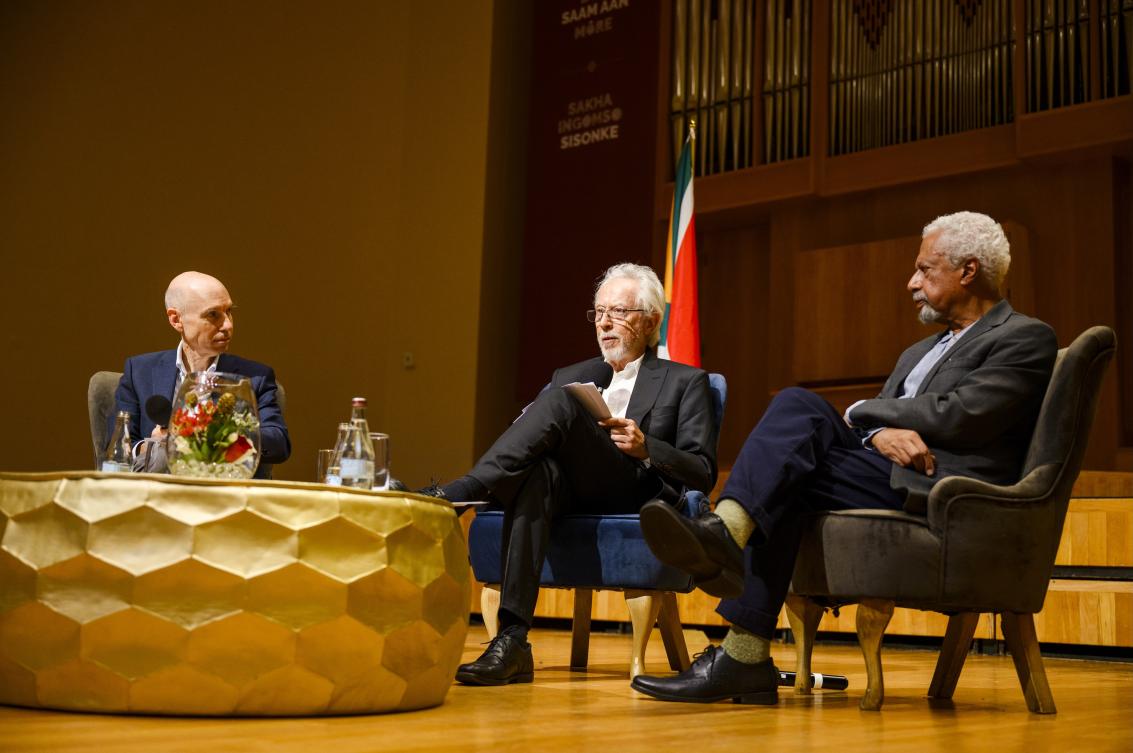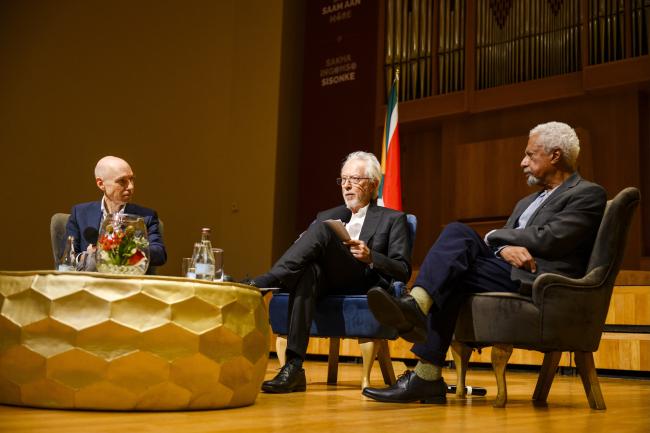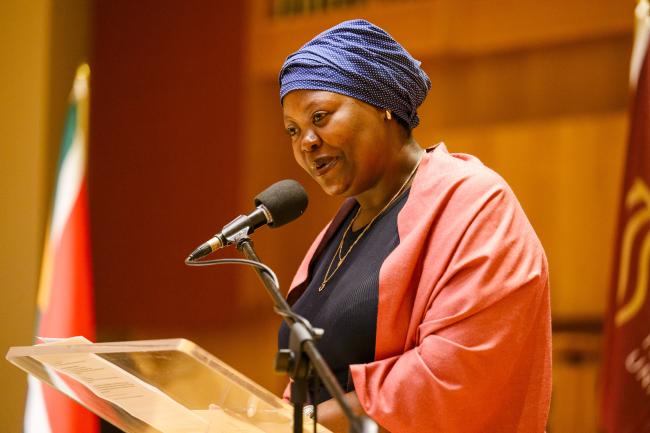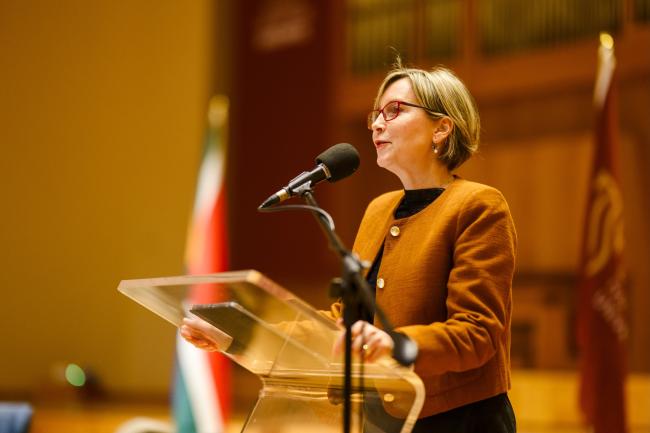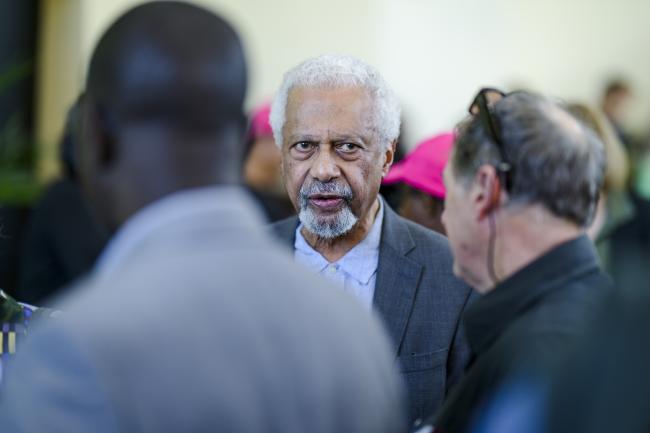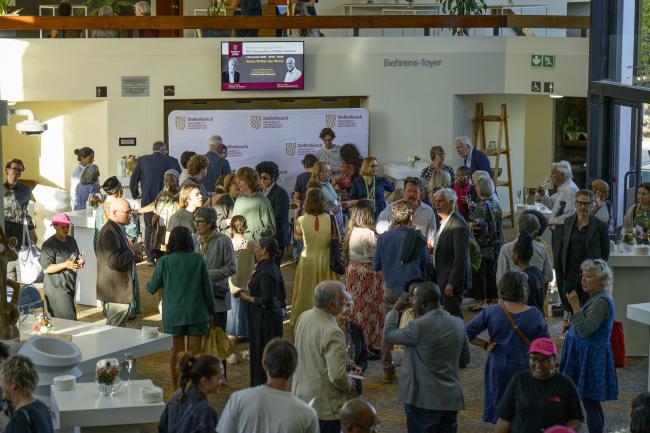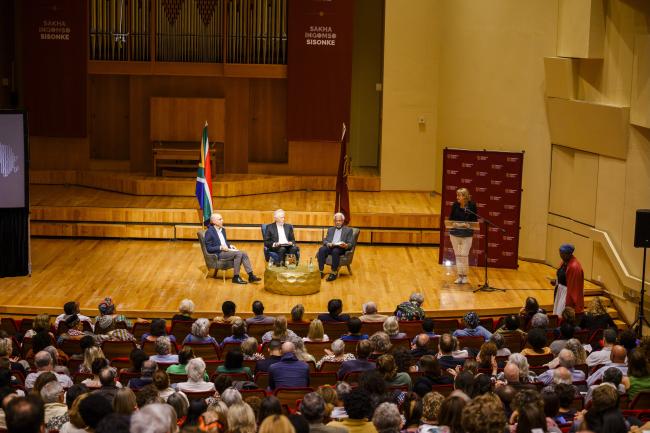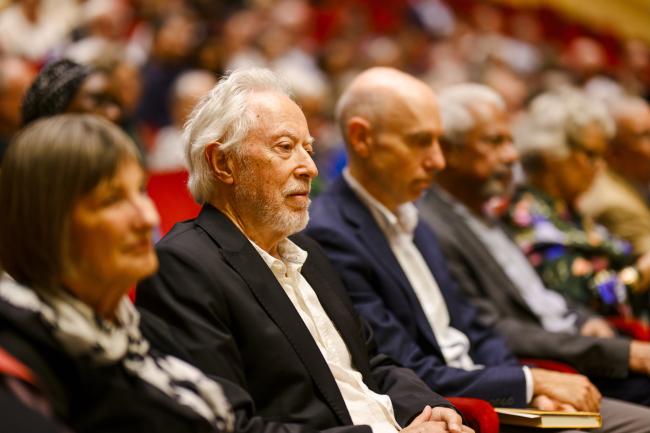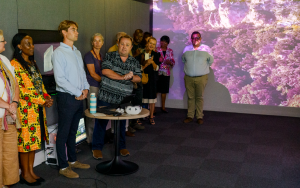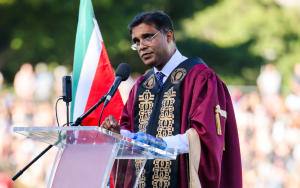
At the Chancellor’s Lecture, South African-born writer Prof JM Coetzee and Tanzanian novelist Prof Abdulrazak Gurnah were in dialogue about how creative writing illuminates our shared humanity.
Literary giants probe writing, power and belonging in Chancellor’s Lecture
- Two African Nobel laureates, JM Coetzee and Abdulrazak Gurnah, probed how Africa “writes the world”.
- The dialogue weighed Anglophone dominance, multilingual realities and translation as the engines of a global literary economy.
- A proposal emerged for an Africa-wide laureateship to raise the profile of literature across the continent.
What, truly, is the meaning of the Nobel Prize for Literature? Who – writer, nation, language or market – does it finally serve? Might it be time, as JM Coetzee asked, to imagine an African prize of comparable stature, conceived, organised and judged on African terms?
These questions framed Stellenbosch University’s (SU) prestigious Chancellor’s Public Lecture this week, a centrepiece of the Nobel Symposia in Literature hosted with the Stellenbosch Institute for Advanced Study (STIAS). The Endler Hall was filled with scholars, students and literary admirers to witness two giants of the world of letters – both born in Africa and both Nobel laureates – thinking aloud with calm intensity, about the prizes, languages and histories through which literature circulates.
‘Africa writes the world anew’
Welcoming guests, Rector and Vice-Chancellor Prof Deresh Ramjugernath conveyed greetings from Chancellor Lesetja Kganyago who could not attend in person, and affirmed literature’s power to shape “just, imaginative and humane societies”. The occasion, he said, was “a rare and precious moment”: South African-born Prof JM Coetzee and Tanzanian novelist Prof Abdulrazak Gurnah in dialogue about how creative writing illuminates our shared humanity. “Africa does not merely add its voice to global literature,” Ramjugernath concluded. “It writes the world anew.”
Dean of Arts and Social Sciences Prof Vasti Roodt introduced the speakers and moderator – Stockholm University’s Prof Stefan Helgesson – with an elegant meditation on why, in an age of AI prose, we still gather for writers. Great literature, she said, does not parrot us; it “represents the world and the human condition in ways that unsettle, wound and delight”, books that are, in Franz Kafka’s phrase, “an axe for the frozen sea inside us”.
Coetzee: prizes and the world literary economy
With characteristic composure and a dry, sardonic edge, Coetzee began by noting the obvious: he and Gurnah were on stage in Stellenbosch “not because we’ve been crowned by any African Academy, but because we won a Swedish prize”, a situation he finds “strange, disturbing, anomalous”. He then traced how the Nobel literature prize shifted from a Nordic remit to a global one, informally rotating among continents and, more recently, addressing gender imbalance. Unlike the science Nobels, he argued, the literature award functions within a symbolic economy of prestige as much as within a technical consensus.
If the prize is universalist in aspiration, he suggested, it is also inevitably shaped by the Swedish Academy’s European vantage. Still, he urged charity: the Academy acts in good faith, within limits, to name an annual winner. Coetzee’s central claim landed with force: we should think of prizes as part of a wider literary economy – a system of writers, translators, agents, publishers, judges, festivals and media. Within that system, he proposed, an Africa-wide laureateship – selected by respected jurors, funded to travel the continent raising the profile of literature – may be more fitting than trying to “compete” with the Nobel prize.
Gurnah: encounters, audacity and the question of ‘world’
Gurnah’s contribution, also serious yet generous, took the evening’s theme – “Africa Writes the World” – and asked what “world” signifies. Too often, he said, it defaults to Europe and the West, for obvious historical reasons. But Africa’s world has also always included the Indian Ocean, the Mediterranean, and other south-south circuits. He revisited the 1956 Congress of Black Writers and Artists in Paris through James Baldwin’s skeptical essay Princes and Powers, and considered George Lamming’s insistence on the “immensity and variety” of Black experience.
Then, reading Wole Soyinka’s “Telephone Conversation”, Gurnah recalled encountering the poem as a teenager in colonial Zanzibar and being struck by its audacity – the way wit and courtesy unmask pieties and prejudice. The reading set up his closing triad of intriguing questions: “Was that a man speaking or the period speaking? Does anyone write about migration with affection? Do women write about the world differently?”
Prizes change, languages persist
Moderating with tact and precision, Helgesson tied the two talks together: literature is not “stardust” but produced within institutions; prizes combine pecuniary and symbolic capital. He noted scholarship showing how media and organisational muscle – television, publicity, archives – amplified awards like the Booker and Nobel over time. Coetzee added that such power is no accident: “Prizes don’t acquire their power by magic,” but through skilful management, he noted. Gurnah agreed, observing how televising the Booker in 1980 transformed a modest prize into a national spectacle.
When the conversation turned to curriculum and cosmopolitanism, Helgesson invoked the Nairobi “abolish the English department” moment of the late 1960s. Gurnah cautioned that while the manifesto’s horizon was liberating, the practicalities of staffing and expertise matter: you cannot “teach everything” merely by willing it; the real task is to pry open narrow syllabi without collapsing standards.
Anglophone dominance and the work of translation
Language, unsurprisingly, became the evening’s most intricate terrain. Coetzee described his attempt with The Pole to upend Anglophone primacy by publishing in Spanish first and revising the English to match the Spanish so neither would be secondary. “Publishers refused to translate from Spanish,” he said dryly. “I was known to be an English-language writer; therefore the English had to be the ‘original’.” The experiment, he conceded, “came to nothing”, a revealing case study in how markets constrain literary innovation.
Gurnah explained his steady, purposeful insertion of Swahili into his English prose: sometimes there is no exact English equivalent; sometimes the non-English word locates the scene; and sometimes it simply gives the sentence the right texture. Readers, he suggested, can glide “in and out of comprehension” – looking up what they wish, inferring the rest – because that is how literature is read.
Both writers highlighted the centrality of translators. Coetzee spoke with warmth about the voices he hears in German and Dutch, versions he sometimes prefers to his own English. Gurnah, trusting but pragmatic, relies on publishers and readers to signal problems, while celebrating the craft of those who have rendered his novels into other tongues. Translation, Helgesson concluded, is the bridgework of the literary economy and a creative practice in its own right.
Whose Africa? Which world?
A late exchange pressed the category “African literature” itself. Coetzee mischievously floated Wilbur Smith as a provocation about African belonging and the world’s gaze. Gurnah, meanwhile, charted English’s ascent in Tanzania, from near absence in his parents’ generation to a commonplace among today’s children, driven by schooling, media and the gravitational pull of the United States. The result, the panel agreed, is a multilingual reality in which the Anglosphere exerts outsized influence even as French, Portuguese, Arabic and countless African languages sustain vigorous literary economies of their own.
In her vote of thanks, Prof Stella Viljoen captured the evening’s blend of gravitas and quiet daring. Addressing Coetzee, she praised his “irreverence” and “ability to critique from within”; to Gurnah, she saluted a contribution that, like his novels, opens worlds. Thanking Helgesson for incisive questions, she described the discussion as “powerful and persuasive, but also wonderfully decolonial.”
> > Watch the a recording of the lecture here.

